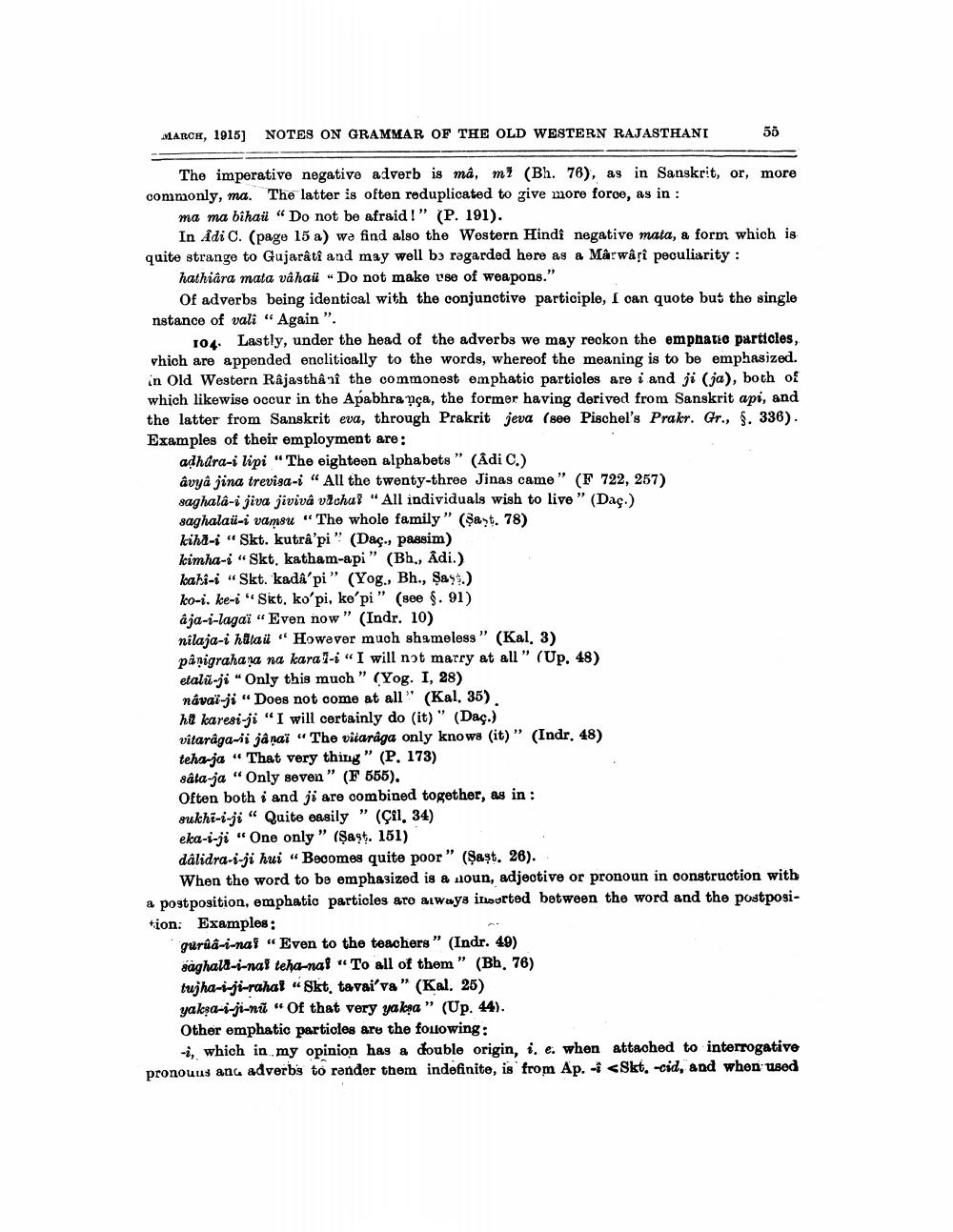________________
MARCH, 1915] NOTES ON GRAMMAR OF THE OLD WESTERN RAJASTHANI
55
The imperative negative adverb is mâ, mi (Bh. 76), as in Sanskrit, or, more commonly, ma. The latter is often reduplicated to give more force, as in:
ma ma bihaü "Do not be afraid I” (P. 191).
In Adi C. (page 15 a) wa find also the Western Hindi negative mata, a form which is quite strange to Gujarati and may well by ragarded here as a Mârwârî peculiarity :
hathiara mata váhai - Do not make use of weapons."
Of adverbs being identical with the conjunctive participle, I can quote but the single nstance of vali " Again".
104. Lastly, under the head of the adverbs we may reckon the emphatio particles, vhich are appended enclitically to the words, whereof the meaning is to be emphasized. in Old Western Rajasthani the commonest emphatic particles are i and ji (ja), both of which likewise occur in the Apabhra ça, the former having derived from Sanskrit api, and the latter from Sanskrit eva, through Prakrit jeva (see Pischel's Prakr. Gr., §. 336). Examples of their employment are :
adhara-i lipi "The eighteen alphabets" (Adi C.) âvya jina trevisa-i "All the twenty-three Jinas came" (F 722, 257) saghala-i jiva jiviva vichar "All individuals wish to live" (Daç.) saghalaü-i vamsu “The whole family" (fast. 78) kiha-i " Skt. kutrâ'pi" (Daç., passim) leimha-i "Skt. katham-api" (Bh., Adi.) kahi-i "Skt. kada' pi” (Yog., Bh., Şast.) ko-i. ke-i "Sist, ko'pi, ko'pi" (see $. 91) aja-j-lagai “Even now" (Indr. 10) nilaja-i hilail " However much shameless " (Kal. 3) panigrahara na kara 7-1 "I will not marry at all" (Up. 48) etalū-ji "Only this much" (Yog. I, 28) návai-ji “Does not come at all" (Kal. 35) hi karesi-ji "I will certainly do (it)" (Daç.) vitaraga-ii ja nai "The vijaraga only knows (it)" (Indr. 48) teha ja “That very thing" (P. 173) sala-ja “Only seven" (F 655). Often both i and ji are combined together, as in: sukhi-i-ji" Quite easily ” (Çil, 34) eka-i-ji "One only " (şaşt. 151) dalidra-i-ji hui "Becomes quite poor" (şaşt. 26).
When the word to be emphasized is a noun, adjective or pronoun in construction with a postposition, emphatio particles aro always insorted between the word and the postposition: Examples:
gura-i-nal “Even to the teachers” (Indr. 49) saghall-i-nal teha-nal "To all of them " (Bh. 76) tujha-i-ji-rahal “Skt. tavai'va" (Kal. 25) yakşa-i-ji-nữ “Of that very yakşa” (Up. 44). Other emphatic particles are the following:
-, which in my opinion has a double origin, i, e. when attached to interrogative pronouus ang adverbs to render them indefinite, is from Ap. - <Skt. -cid, and when used




